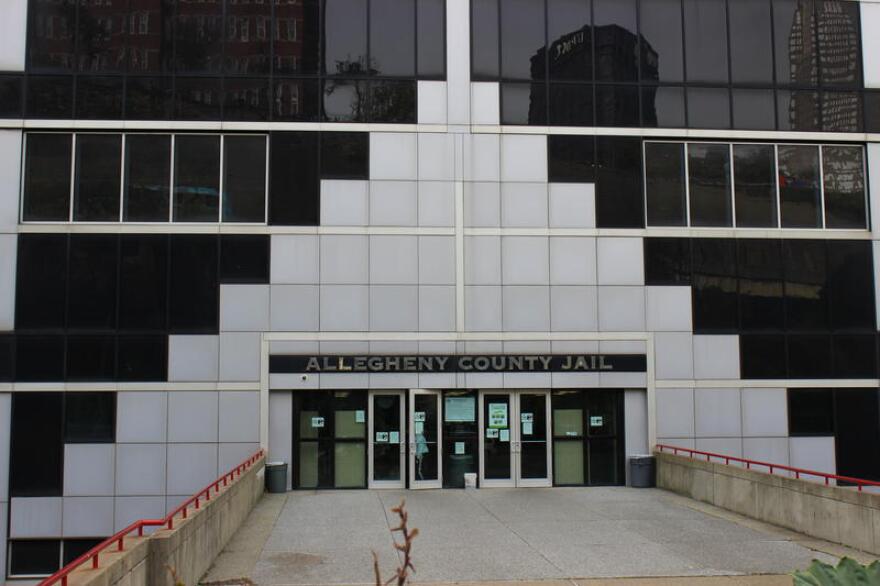During a federal court hearing Tuesday, a top Allegheny County Jail official offered new details Tuesday on measures the facility has taken to ward off a potential outbreak of COVID-19 within its walls. But critics warned the jail’s plan, and its execution, are riddled with shortcomings that put inmates and staff at heightened risk of infection.
Laura Williams, the Deputy Chief Warden of Health Care Services at Allegheny County Jail, offered extensive courtroom testimony about new sanitation, housing, screening, and treatment protocols the jail has adopted in response to the coronavirus pandemic.
“Correctional facilities are at a risk,” Williams said, noting that many incarcerated people have medical conditions that make them vulnerable to the virus, and that tight quarters increase the odds of transmission. But she added that jail officials “are familiar with practices regarding infection control, as this will not be the first time nor the last time that we will be presented with a disease that could spread.”
In a memo filed with the federal court, jail officials outlined a series of policies meant to combat the virus. Staff and inmates, for example, are required to answer screening questions and have their temperatures taken before they’re allowed to enter the jail. Inmates who don’t pass the screening are given a mask and placed in their own cell pending further monitoring. Employees, meanwhile, are sent home.
Inside the jail, commonly touched surfaces must be disinfected regularly with a bleach and water solution. Williams said inmates have cleaned the phones they use to participate in arraignment hearings “so extensively we’ve already had to replace five.”
None of the jail’s inmates have tested positive for COVID-19 yet, though one staff person was diagnosed with the disease two weeks ago. County data show that seven inmates and four employees have been tested.
But epidemiologist Homer Venters warned that jails and prisons are especially vulnerable to outbreaks. He noted that cases had exploded at facilities elsewhere, including New York’s Rikers Island Jail and a federal prison near Elkton, Ohio.
“There is no doubt that when COVID-19 is in a community, it will be in the correctional setting – they are part of the community,” said Venters, who previously served as the chief medical officer for the New York City Jail system. He later added, “When COVID-19 arrives in a jail or prison or detention center, it spreads like wildfire, and that rapid escalation of cases will overwhelm local health systems.”
Venters said that, after reviewing the jail’s plan for responding to coronavirus and speaking with employees and a former inmate, he worried officials were not taking sufficient precautions.
He was concerned, for example, that the facility isn't separating inmates with preexisting conditions from those at lower risk of serious illness or death. And he suggested the jail would not have adequate medical staffing in the event of an outbreak. Even if the overall jail population declines, he said, “Specialized housing areas will require much more intensive nurse work.”
The Allegheny County Controller’s Office confirmed that the jail currently does not have a medical director or director of nursing, and that 10 nurses had recently resigned.
Venters said employees had also told him they had not received instructions on how to make disinfecting solution, and that the quality varied widely. He said he'd also heard that staff had not been given paper towels for cleaning, but instead use rags, which Venters said “simply [move] virus from one place to another.”
Inmates have, however, received more bar soap to encourage hand washing, according to the jail memo. Williams, the deputy warden, said while inmates and staff are also given masks upon request, they are not required to wear them. She acknowledged that before Saturday, the jail did not provide masks, and that during that period, an employee was sent home for refusing to clean an empty cell without one. Another employee, who lives with an elderly family member, also complained about the lack of protective gear, Williams said.
She said the jail has evacuated some housing units to free up space for those who might become infected and need to be isolated. The rest of the inmates are now consolidated onto fewer floors.
That arrangement has raised concerns that inmates cannot keep a safe distance from one another to prevent spread of the disease.
Williams said, however, that by concentrating the incarcerated population in fewer units, the jail can deploy staff and resources more efficiently. And she noted that the courts helped to reduce the population by expediting the release of inmates in response to the pandemic. A county spokesperson said 855 inmates had been freed between March 16 and April 6.
Public defender Linda Cohn called Venters and Williams to testify Tuesday in the case of a federal defendant being held at the county jail. Cohn asked U.S. Magistrate Judge Lisa Lenihan to release Donnell Warren, who has been detained for nearly three years on drug and firearms-related offenses.
Under a plea deal awaiting a judge’s approval, Warren could be released as soon as May, Cohn said. The defense attorney argued that in the meantime, her client posed little risk of flight, and that his release from jail would help to reduce the chance of an outbreak within the facility. But Lenihan denied Cohn's request, saying it would be better to schedule the defendant’s next court date “as soon as possible.”
“Frankly,” the judge said, “I was impressed by [Williams’ testimony]. It appears to me that they have a very comprehensive plan at the Allegheny County Jail.”




